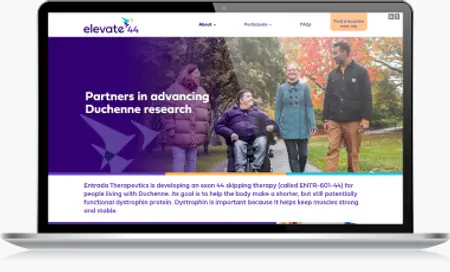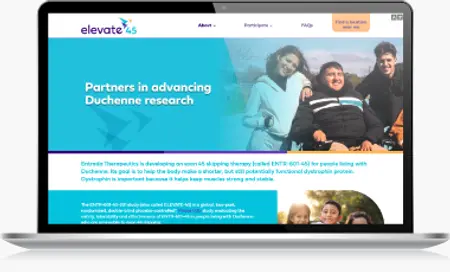Clinical Studies
Our Clinical Studies
Entrada Therapeutics is working to advance potential treatments spanning multiple disease areas to transform the lives of patients and their families. We are currently conducting clinical studies of study drugs for people living with Duchenne muscular dystrophy who are amenable to exon 44 and exon 45 skipping.
To learn more about our other programs, visit our pipeline page.
Find a Clinical Study

Contact Us
Advancing life-changing therapies is not possible without the participation of patients and their families in clinical studies. If you are interested in learning more about our active studies, or have questions about our Commitment to Clinical Studies, please contact our Patient Advocacy team at PatientAdvocacy@entradatx.com.
Our Commitment to Clinical Studies
We are committed to operating clinical studies that are inclusive and accessible. That’s why we take additional steps to ensure that participants of all backgrounds feel supported throughout the entire process. This includes working with community members and advocacy groups, who have helped to inform our clinical studies and support materials.
Participants’ study-related care will be provided by a study doctor and team with deep experience in the condition being evaluated.
Reasonable study-related expenses, such as travel, accommodation and meals will be covered for study participants in accordance with local regulations. This includes booking assistance for travel and lodging.
We prioritize offering home visits whenever possible during the study to minimize the need for travel and lessen disruption to participants’ lives while assuring safety is not compromised.
We acknowledge that there are disparities in healthcare and in access to clinical studies. We are committed to working with communities to make study participation available to people who have historically been left out of these opportunities.
Inclusive Clinical Studies
We recognize that disparities in their many forms can impact how patients respond to therapy, so ensuring representation in our clinical studies is crucial. As we advance our clinical studies, we're developing programs to support the needs of often underrepresented populations and selecting partners who understand and share in this commitment.
Recruiting and retaining diverse populations of participants helps determine whether our investigational therapies are safe and effective in patients across different demographics like race, ethnicity, age, biological sex and more. This is critical to our mission of transforming the lives of all patients impacted by the diseases we’re targeting.


Data Sharing
Entrada is committed to publishing the results of our clinical research in a transparent and scientifically accurate manner. Sharing data not only benefits the understanding of diseases, but also provides patients and families with valuable information that can drive care decisions. We recognize that for many in the communities we serve, there is urgency in seeking new treatments. That’s why we aim to provide timely updates on our pipeline progress whenever possible.
At times, the laws, rules and policies we must follow may limit how much information we can report. We will be as direct as possible about our limitations and how soon we might be able to share more details.
Expanded Access Policy
Entrada is committed to advancing safe and effective therapies with the potential to transform the lives of patients and their families. We believe the best way to achieve this is by conducting clinical studies and seeking regulatory approval.
Clinical studies assess the safety and effectiveness of investigational medicines, which, if established, will help us obtain approvals from regulatory authorities across the globe, like the U.S. Food and Drug Administration (FDA). To ensure clinical studies are as safe as possible for participants and to enable researchers to obtain and evaluate the most accurate and relevant results, participants must meet certain eligibility criteria. These criteria may include confirmed diagnosis, age and current medicine(s) that the participant may be taking.
Expanded access, also known as compassionate use or early access, allows patients who do not meet a study’s eligibility criteria to receive the investigational medicine outside of a clinical study.
At this time, we are not able to offer expanded access to Entrada’s investigational medicines. We will continue to evaluate the possibility of offering expanded access and will update our policy if our position changes.
Should patients or their families have further questions or require additional information about the status of our investigational medicines, please contact our patient advocacy team at: PatientAdvocacy@entradatx.com.
To learn more about how we honor your privacy, click to see our Privacy Notice.

About Clinical Studies
Entrada adapted the below information from materials developed by the Center for Information and Study on Clinical Research Participation, an independent non-profit organization dedicated to engaging the public and patients as partners in the clinical research process.
Clinical studies are the best way to evaluate a study drug and learn if it works and how safe it is. If you have ever taken medicine or gotten a vaccine, then you have benefited from clinical studies.
Studies try to answer specific health questions, like if the study drug has any effects on the disease, if it could work better than an existing treatment and if it’s safe for people to use. A “study drug” means that it has not been approved by a government agency for use outside of clinical studies. If clinical studies show that the study drug works and is safe, then it can be submitted for approval to government agencies. If approved, the study drug can then become available to the people who need it.
People participate in clinical studies for a variety of reasons. Some participate to help others and to increase the understanding of a condition or the science behind a study drug. Those with a disease might participate to receive access to a study drug before it is approved and accessible to the general public.
Clinical studies come with risks. Comparing the potential risks and benefits is an important part of deciding whether to participate. If you or a loved one are interested in participating in a clinical study, consult your doctor to determine eligibility and collect the information needed to make an informed decision.
A placebo looks like a study drug but does not have any medicine in it. Researchers use placebos to help make sure any changes in participants’ health are actually caused by the study drug. In a placebo-controlled study, participants are often randomly assigned (also known as randomization) to receive either the study drug or the placebo. Both researchers and participants may not know who received the placebo until after the study.
Information on active studies can be found by searching the clinical study databases below.
ClinicalTrials.gov ISRCTN Registry EU Clinical Trials Register
Pan African Clinical Trial Registry WHO International Clinical Trials Registry Platform
Patient advocacy organizations, such as the World Duchenne Organization, also maintain a list of ongoing Duchenne studies.
Each study needs participants who meet certain requirements, like having a certain disease or medical condition. These requirements are called inclusion criteria. Other inclusion criteria could be characteristics like age, sex and current medicine(s) that the participant may be taking.
Clinical studies have specific requirements to ensure safety. These requirements might exclude participation by people whose conditions could worsen with the study drug. This helps protect participants from potential harm. These requirements are called exclusion criteria.
Inclusion and exclusion criteria are in place to make sure the researchers get the most accurate results and make studies as safe as possible for participants.
It's best to ask your/your child’s doctor that you see for Duchenne care or speak with representatives from a Duchenne patient advocacy group.
At Entrada, we understand that enrolling in a clinical study is a meaningful decision for families, and we are committed to treating each participant with fairness and respect throughout the process. Siblings are welcome to participate in the same study and will be treated as individual participants. Each sibling must individually meet the medical and study eligibility criteria as defined in the protocol and assessed by the study doctor. There are no restrictions to sibling participation in Entrada studies.




